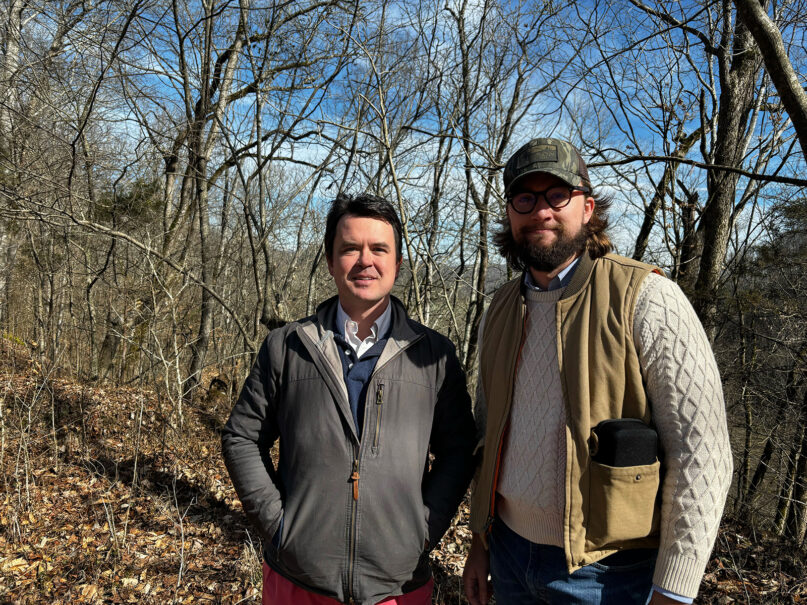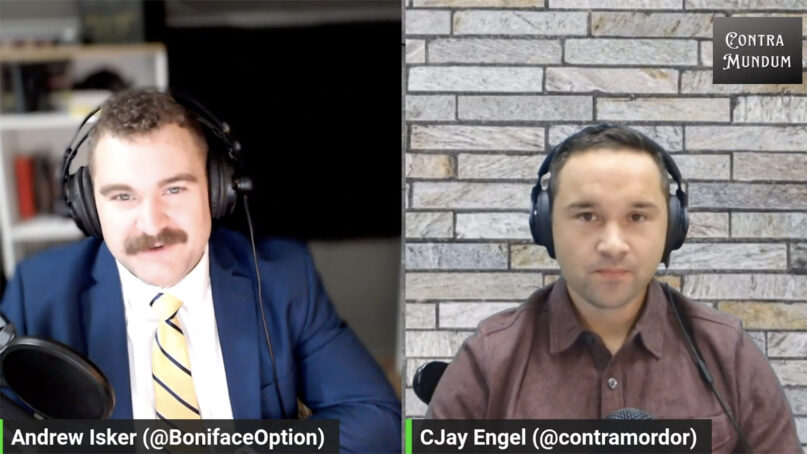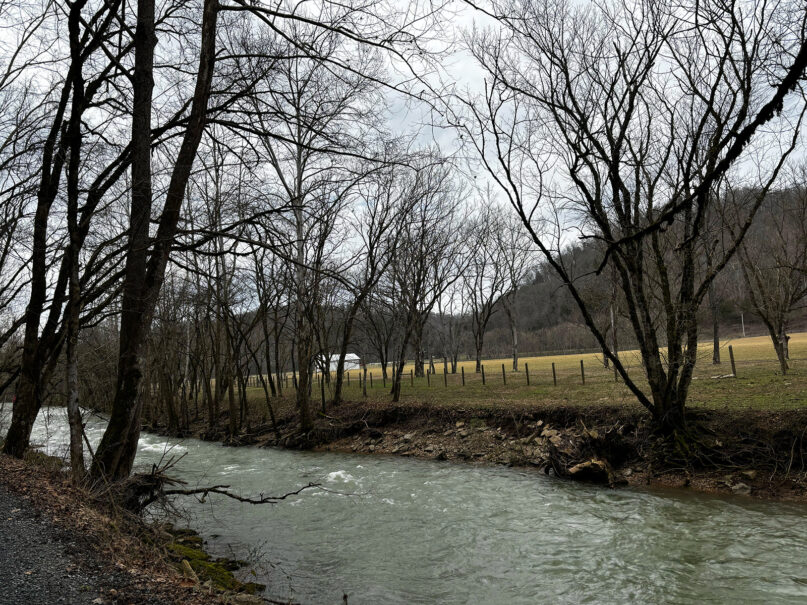Whitleyville, Tenn. (RNS) — On a sunny morning in mid-February, Josh Abbotoy, who describes himself as a “conservative Christian who does land deals,” drove a 20-year-old Lexus LX470 around a former farm, crossing a creek, squeezing by a run-down barn and driving along one of the farm’s roads in hopes of showing off the view from one of the ridgetops.
But there had been too much rain and the road was muddy, so he parked and hopped out for a 10-minute walk up to the ridgetop, admiring the red cedars and Bois d’Arc trees that line the hillsides.
At the top of the ridge, Abbotoy surveyed the view of the green fields and rolling hills while painting a picture of a community filled with lovely homes and families, looking down over wide fields and a stately church.
A month earlier, RidgeRunner, a real estate company Abbotoy runs, announced it had bought the 448-acre farm, with hopes of developing it into an “agrihood” — with about 30 estate-style homes dotting the farm’s hillsides.
“The fields will be filled with livestock as God intended and as Jackson County remembers,” the RidgeRunner website read in announcing the purchase. “Our goal will be to preserve the sweeping views for those who build and live on the farm’s ridgetops.”
Abbotoy said it’s too early to tell how much lots on the farm will cost but said there will be a premium for ridgetop views. A similar RidgeRunner project in Kentucky, where land prices are lower, has lots priced from $35,000 to $329,000. While the Whitleyville farm has access to city water, high-speed internet and electricity, there’s still a lot of work to do on the property’s infrastructure.

Josh Abbotoy, left, and Patrick Thomas on a farm they hope to develop in Whitleyville, Tenn. (RNS photo/Bob Smietana)
But if all goes to plan, within a few years the former farm property will be filled with conservative Christians who have moved from blue states to this rural corner of the Bible Belt.
It’s the Big Sort as a business opportunity.
A former corporate lawyer turned entrepreneur and Christian publisher, Abbotoy is fond of quoting journalist Bill Bishop’s influential 2009 book about how Americans increasingly live in like-minded clusters.
That trend has accelerated in recent years, fueled by the work-from-anywhere revolution set off by the COVID-19 pandemic and the country’s political polarization.
“It’s happening on all sides,” Abbotoy told Religion News Service during a recent visit to the farm in Whitleyville. “People want to live in communities where they have a better shot of having alignment on some really basic political issues.”
Rural Tennessee communities like Jackson County have begun to attract newcomers in recent years, according to data from the Boyd Center for Business & Economic Research at the University of Tennessee in Knoxville, part of an overall pattern of population growth.

A former farm in Jackson County, Tenn., on Feb. 14, 2025, that will potentially be developed by the RidgeRunner real estate company. (RNS photo/Bob Smietana)
“We’ve seen more migration to rural counties so far this decade than in the entire previous decade,” said Matthew Harris, a professor of health economics who does population projection for the state of Tennessee. For example, in Jackson County, more people left than moved in from 2010 to 2020. That trend has begun to reverse.
“A couple hundred people have moved there this decade,” he said.
Abbotoy, who grew up on a small farm in Hartsville about 40 miles west of Whitleyville, sees RidgeRunner as a chance to become part of a conservative gentrification of central Appalachia, where economic decline and brain drain have left communities just waiting to be revitalized.
“If you’re considering a move out here — maybe you live in Silicon Valley and you want to move out to the country,” Abbatoy said, “we’ll be your Sherpa.”
RELATED: How a bucolic Tennessee suburb became a hotbed of ‘Christian Nashville-ism’
A graduate of Catholic University and Harvard Law School, Abbatoy lived for a few years in Boston before practicing corporate law in Houston and Dallas — then returning home. He’s now managing director of New Founding, which invests in “American ideals and a positive national vision” — of which RidgeRunner is a project — and the executive director of American Reformer, a digital publication that seeks to “promote a vigorous Christian approach to the cultural challenges of our day.”
As Forbes recently put it, New Founding is part of a growing movement of “anti-woke” venture capitalists hoping “to remake society with a largely MAGA, tech-driven, Christian worldview.”
Standing on one of the farm’s ridgetops, Abbotoy said he’s not a Christian nationalist, adding, “that’s not my project.” He also said he is not going to let anyone tell him who his friends or his customers ought to be.
“I’ve got customers that are more right-wing than me. I’m not going to talk bad about them,” he said. “I like them. They’re my friends. And I don’t screen their religious or political views any more than I would anybody else.”
Federal fair housing law prohibits that anyway, Abbotoy noted, but the presence of a church on the property will be a signal as to the kind of close-knit community he hopes to build here. Folks are also drawn to Jackson County, he said, because of its Bible Belt culture.
“Even if they’re not Christians, they like being in a community that feels like it’s culturally Christian,” he said.
The proposed church — or at least its pastor, Andrew Isker — has been a source of controversy among locals. Isker, a podcaster and author, relocated from Minnesota to Tennessee to start Whitleyville Reformation Church, which currently is meeting on an invite-only basis during its start-up phase. The congregation plans to build on the RidgeRunner property.
Isker, co-author of “Christian Nationalism: A Biblical Guide For Taking Dominion and Discipling Nations,” with Gab founder Andrew Torba, as well as the author of “The Boniface Option: A Strategy For Christian Counteroffensive in a Post-Christian Nation,” is known for promoting the idea that Christians should dominate American culture and for his criticism of Jews and other non-Christians.
In a podcast earlier this year with Texas pastor Joel Webbon, Isker rejected the idea of “Judeo-Christian religion” and blamed Jews for the rise of secularism.
“We have to be wary of them,” he said. “We have to not allow them to have power in our culture and destroy Christian culture.”
Isker, who did not respond to repeated requests for an interview, has described his move to Tennessee as a chance to live near friends and “laugh at each other’s jokes on our front porch.” But he has also characterized the move in political terms.
“If you were able to take even a few hundred people that all think the same way and have all the same ideas about common good and politics and so forth, and you can consolidate them in the same place, you can exercise far more political power, even with a few hundred or a few thousand people, than you can on your own, widely dispersed across the entire country,” he said in a video posted on social media by RidgeRunner.

Andrew Isker, left, and C. Jay Engel co-host an episiode of the “Contra Mundum” podcast, which aired on Oct 13, 2023. (Video screen grab)
C. Jay Engel, who co-hosts the “Contra Mundum” podcast with Isker, is a recent transplant to Tennessee from California who hopes to buy property from RidgeRunner.
“We love their understanding of how young American conservative families are finding new opportunities to live peaceably and productively among themselves, and I want to involve my family in this meta-trend,” said Engel, who has described the Civil Rights Act as government overreach.
Engel, who calls himself a “Heritage American” — which he has defined as affirming “the domination and pre-eminence of the European derived peoples, their institutions, and their way of life” — declined a request to discuss his political or social views with RNS.
When Nashville’s News Channel 5 reporter Phil Williams reported on Isker’s and Engel’s political views and their ties to the RidgeRunner project, some residents were outraged — rejecting the prospect of these outsiders taking over their community.
Sean Zearfoss is among those concerned about the RidgeRunner project. Zearfoss, a traveling musician, lives in a house he renovated just off the town square in nearby Gainesboro.
“I like the rural community,” said Zearfoss, who also has a place outside Atlanta. “It’s tight-knit. It’s a nice quiet town, right at the Cumberland River in a really beautiful area.”

Buildings along Main Street on the Town Square in Gainesboro, Tenn. (Photo by Brian Stansberry/Wikimedia/Creative Commons)
Zearfoss, who grew up in a conservative evangelical home, said he is fine with the community’s Bible Belt culture, even though his politics lean more progressive.
But the type of Christian nationalism he sees Isker and Engel promoting is a different thing, said Zearfoss.
“I see it like a steamroller trying to roll into town and roll over these people who want to live quiet conservative lives,” he said.
After the backlash to the Channel 5 report, Travis Thomas, a local Church of Christ preacher, decided to host Engel on his call-in YouTube show, “Truth with Proof.” There Engel got an earful from residents who were upset by what they’d heard.
One caller in particular cited Engel’s call to repeal the Civil Rights Act, which brought an end to Jim Crow laws in the South, and asked if he wanted to return to segregation. Engel said matters of race should have been resolved by the states.
“But I’m not for segregation, and I think it’s very harmful to the soul of a nation to participate in those things,” Engel said.

A river flows near Gainesboro, Tenn., on Feb. 16, 2025. (RNS photo/Bob Smietana)
Thomas, a bi-vocational pastor, said Jackson County is still shaped by the Bible Belt, though folks don’t go to church as much as they used to.
“I think it’s a good thing when people move in, especially if they are going to hold to more biblical principles and morals,” he said. “And from what I’ve seen of the individuals that are buying the land, at least they do hold to some kind of moral principles.”
That’s different, he said, than if a group of extremists were building a compound in the area. It’s not like David Koresh is moving to the community, he said.
Thomas said he has also invited Isker to appear on his YouTube channel to talk about religion — and he had some advice for the newcomer.
“He says some of the craziest stuff on his podcast,” Thomas said. “I’ve even told him, you can’t just get on here and say anything on a podcast, because people are watching you. It sounds ridiculous.”
While he appreciates Christian values, Thomas said you can’t force religion on people. And as far as politics goes, Thomas said it’s good to vote, but the church isn’t going to gain power by politics.
“Even in local politics, you can only do so much,” he said. “It’s not like they can come in and take away your freedom of religion.”
Abbotoy, for his part, worries about the decline of American civil religion. What will bind Americans together, he wonders, in the way that Protestant religion did?
“I think every society, if it’s going to stay together, needs to have one,” he said.
That has led some of his friends — and potential customers — to wonder if America was better off when Christianity was more prominent. There are trade-offs and downsides to that kind of arrangement, he said. But those trade-offs are better than what we have now, he added.
“I think you’re seeing a lot of people who are not personally Christian,” he said, “saying, the arrangement we had where Christianity was dominant public orthodoxy was better than what we have now.”
Abbotoy seems to let most of the criticism roll off his back. RidgeRunner, he said, hopes to sell property to people who want to be good neighbors and not try to impose outside views on the local culture. At the same time, new people will be coming, and that will bring change.
“Change is coming,” he said. “The question is, how do you want to direct that?”
RELATED: Decline in American Christian observance has slowed, Pew study finds
(This story was reported with support from the Stiefel Freethought Foundation.




